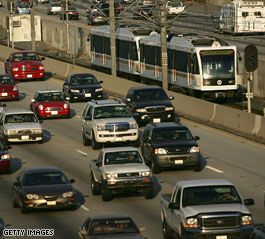American Society of Civil Engineers says under-funding has caused the nation's infrastructure to crumble - and stimulus won't do enough.
NEW YORK (CNNMoney.com) -- The nation's roads, bridges, power grid, water supply, schools and transit systems are all in a state of disrepair due to under-funding - and the proposed stimulus plan will not go far enough to solve the problem, according to a report released Wednesday.
The American Society of Civil Engineers, which represents 146,000 engineers across the country and grades the nation's infrastructure every four years, assigned a "D" grade to the country's infrastructure. The group said the cost to repair crumbling public structures has risen to $2.2 trillion from $1.7 trillion in 2005.
"The nation's infrastructure crisis is endangering our future prosperity," ASCE President Wayne Klotz said at a press conference. "Crumbling infrastructure has a direct impact on our personal and economic health."
The group rated 15 infrastructure categories, none of which received a grader higher than "C+." Drinking water, inland waterways, levees, roads and wastewater facilities all received a "D-," the lowest grades on the 2009 report card.
Roads got a particularly poor grade, as Americans spend an estimated 4.2 billion hours a year stuck in traffic, which costs the economy about $78.2 billion a year, according to ASCE. Highway construction is set to receive $30 billion from the stimulus plan - the largest portion of infrastructure spending in the bill.
The national power grid, another key project in the stimulus plan, got a "D+." ASCE said public investment on the grid has not met rising demand for power and electric utility investment needs could rise to $1.5 trillion in 20 years. President Obama has proposed updating the existing structure to a new "smart" grid.
But even if the federal government passes its economic stimulus plan, ASCE still estimates that infrastructure will be under-funded by $1.1 trillion. State and federal spending will only amount to $903 billion in the next five years, according to the group's estimates, and stimulus spending is expected to be less than $100 billion.
The group said the stimulus program would amount to a good start, but the country "clearly still has a long way to go."
"By all accounts, infrastructure investment only represents a small percentage of the overall package," said Klotz. "Even with the stimulus package, there remains a still significant - some would say staggering - $1.1 trillion gap in funding."
Still, Klotz supported the bill, calling government's effort a historic level of leadership." He said that each billion dollars spent on infrastructure supports 35,000 jobs and is a key element of the economy's recovery efforts.
The report also presented several broad solutions to the problem, including increasing infrastructure investment on a state and federal level, promoting a culture of sustainability and developing plans for future public works programs.

No comments:
Post a Comment